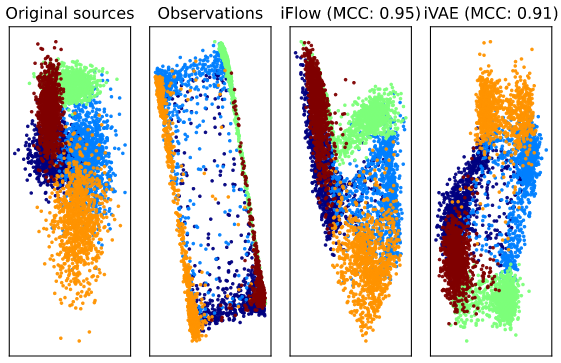Identifying through Flows for Recovering Latent Representations
Identifiability, or recovery of the true latent representations from which the observed data originates, is de facto a fundamental goal of representation learning. Yet, most deep generative models do not address the question of identifiability, and thus fail to deliver on the promise of the recovery of the true latent sources that generate the observations. Recent work proposed identifiable generative modelling using variational autoencoders (iVAE) with a theory of identifiability. Due to the intractablity of KL divergence between variational approximate posterior and the true posterior, however, iVAE has to maximize the evidence lower bound (ELBO) of the marginal likelihood, leading to suboptimal solutions in both theory and practice. In contrast, we propose an identifiable framework for estimating latent representations using a flow-based model (iFlow). Our approach directly maximizes the marginal likelihood, allowing for theoretical guarantees on identifiability, thereby dispensing with variational approximations. We derive its optimization objective in analytical form, making it possible to train iFlow in an end-to-end manner. Simulations on synthetic data validate the correctness and effectiveness of our proposed method and demonstrate its practical advantages over other existing methods.
PDF Abstract ICLR 2020 PDF ICLR 2020 AbstractDatasets
Reproducibility Reports
The obtained mean and standard deviation of the MCC over 100 seeds are within 1 percent of the results reported in the paper. The iFlow model obtained a mean MCC score of 0.718 (0.067). Efforts to improve and correct the baseline increased the mean MCC score from 0.483 (0.059) to 0.556 (0.061). The performance, however, remains worse than the performance of iFlow, further supporting the authorsʼ claim that the iFlow implementation is correct and more effective than iVAE.


